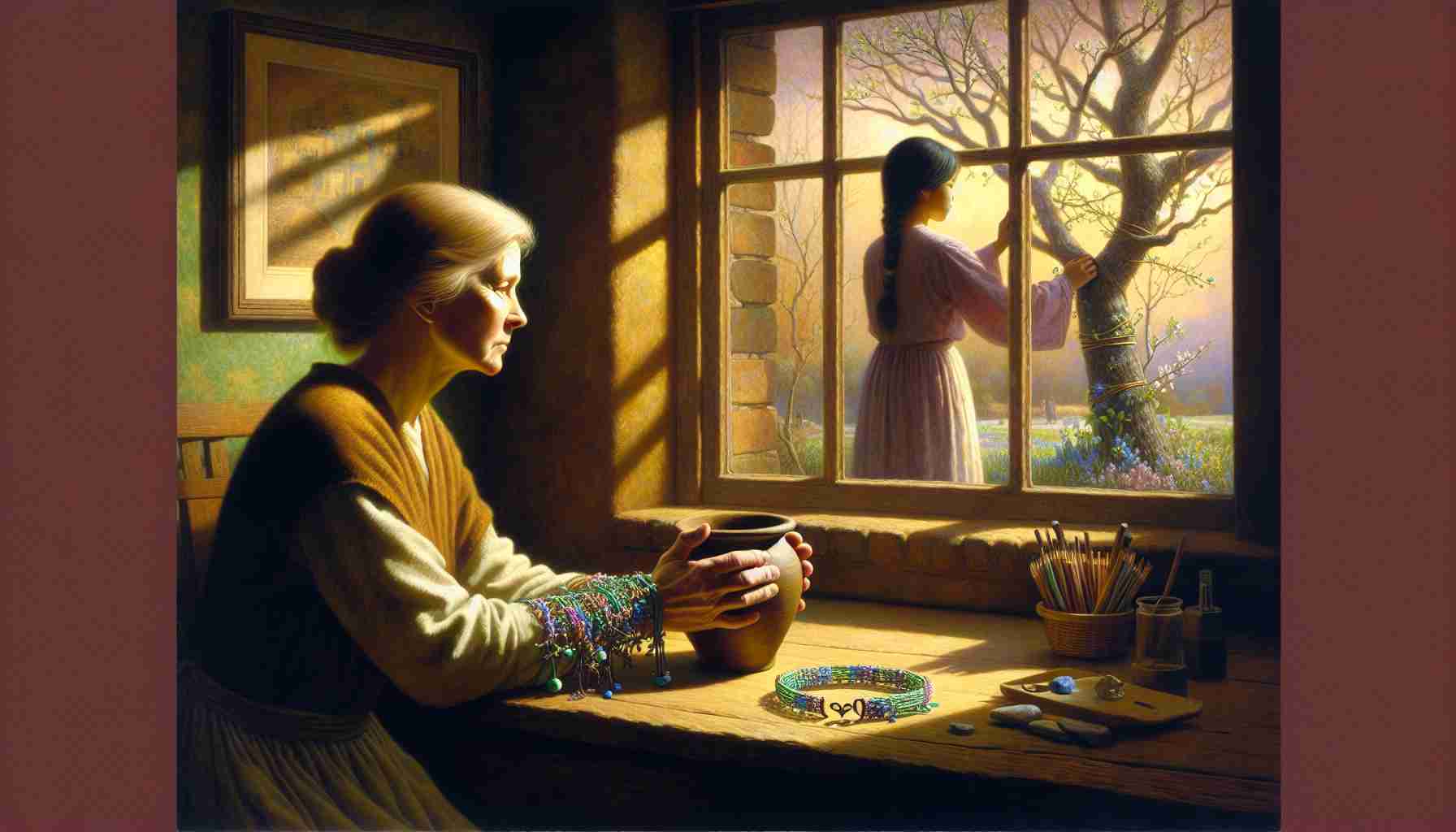

Miriam stood by the cracked windowpane, her hands wrapped around a chipped clay mug of too-cold tea. Outside, the first shy hints of spring tiptoed into the world—the barest mist of green on the branches, the hesitant bloom of wildflowers below the orchard trees. She watched without really seeing, heart heavy with the kind of waiting that bruises the spirit.
Three years of prayers. Three years of silent nights and tear-stained pillows. Three years of hoping she would cradle a child of her own.
Her hands tightened on the mug. A part of her wanted to stop hoping. It felt safer not to want anymore. Safer to give G-d silence in place of pleas.
She thought of Psalm 27: "Hope in Hashem, be strong and let your heart take courage." But how? How did one keep hoping when the waiting stretched out like a desert with no promised end?
Behind her, the wooden floor creaked — a soft, almost apologetic sound. Miriam turned to see her little niece, Noa, barefoot and smiling shyly, clutching something close to her chest.
"I made you something," Noa said, voice small.
Curious, Miriam set down her mug. The little girl sat cross-legged at her feet and opened her hands.
Nestled in her palm was a woven bracelet, clumsily knotted from different colored threads: blue, green, purple. One tiny bead, shaped like a heart, dangled at its center.
"It's a waiting bracelet," Noa explained proudly. "You wear it when you're waiting for something important. Abba says waiting makes our souls grow strong, like trees."
Miriam pressed her fingers to her mouth, blinking back sudden tears. Slowly, she bent and let Noa slide the bracelet over her wrist. The threads tickled her skin, warm from the child's small grasp.
In that quiet moment, something inside her shifted—not loudly, not with fireworks, but like a seed uncurling underground.
Waiting wasn’t a punishment. Maybe... maybe it was a kind of growing. Silent, unseen, but real.
Later, as the sun dipped low, Miriam stepped outside. The early evening brushed golden light across the fields. A hawk soared above, wings slicing the sky with surety. High up, beyond reach, yet unhurried. Trusting the wind to carry it.
She stood there a long time, wrist tingling where Noa's bracelet rested. And without forcing it, without bargaining or begging, Miriam breathed a prayer toward the quiet heavens:
"I’m tired, Hashem. But I'll keep waiting. I'll trust You with my heart."
She closed her eyes and listened to the wind whisper through the budding branches. And for the first time in months, her heart didn't feel like crumbling earth. It felt like freshly turned soil—aching, yes, but ready for rain.
When she went back inside, she lit a small candle on the windowsill. No miracle had come yet. But Miriam understood, in her very bones, that hope itself was holy—a flame worth protecting.
And somehow, mysteriously, the waiting no longer felt empty.
It was full.
✨
Supporting Torah and Tanakh Verses:
Miriam stood by the cracked windowpane, her hands wrapped around a chipped clay mug of too-cold tea. Outside, the first shy hints of spring tiptoed into the world—the barest mist of green on the branches, the hesitant bloom of wildflowers below the orchard trees. She watched without really seeing, heart heavy with the kind of waiting that bruises the spirit.
Three years of prayers. Three years of silent nights and tear-stained pillows. Three years of hoping she would cradle a child of her own.
Her hands tightened on the mug. A part of her wanted to stop hoping. It felt safer not to want anymore. Safer to give G-d silence in place of pleas.
She thought of Psalm 27: "Hope in Hashem, be strong and let your heart take courage." But how? How did one keep hoping when the waiting stretched out like a desert with no promised end?
Behind her, the wooden floor creaked — a soft, almost apologetic sound. Miriam turned to see her little niece, Noa, barefoot and smiling shyly, clutching something close to her chest.
"I made you something," Noa said, voice small.
Curious, Miriam set down her mug. The little girl sat cross-legged at her feet and opened her hands.
Nestled in her palm was a woven bracelet, clumsily knotted from different colored threads: blue, green, purple. One tiny bead, shaped like a heart, dangled at its center.
"It's a waiting bracelet," Noa explained proudly. "You wear it when you're waiting for something important. Abba says waiting makes our souls grow strong, like trees."
Miriam pressed her fingers to her mouth, blinking back sudden tears. Slowly, she bent and let Noa slide the bracelet over her wrist. The threads tickled her skin, warm from the child's small grasp.
In that quiet moment, something inside her shifted—not loudly, not with fireworks, but like a seed uncurling underground.
Waiting wasn’t a punishment. Maybe... maybe it was a kind of growing. Silent, unseen, but real.
Later, as the sun dipped low, Miriam stepped outside. The early evening brushed golden light across the fields. A hawk soared above, wings slicing the sky with surety. High up, beyond reach, yet unhurried. Trusting the wind to carry it.
She stood there a long time, wrist tingling where Noa's bracelet rested. And without forcing it, without bargaining or begging, Miriam breathed a prayer toward the quiet heavens:
"I’m tired, Hashem. But I'll keep waiting. I'll trust You with my heart."
She closed her eyes and listened to the wind whisper through the budding branches. And for the first time in months, her heart didn't feel like crumbling earth. It felt like freshly turned soil—aching, yes, but ready for rain.
When she went back inside, she lit a small candle on the windowsill. No miracle had come yet. But Miriam understood, in her very bones, that hope itself was holy—a flame worth protecting.
And somehow, mysteriously, the waiting no longer felt empty.
It was full.
✨
Supporting Torah and Tanakh Verses: